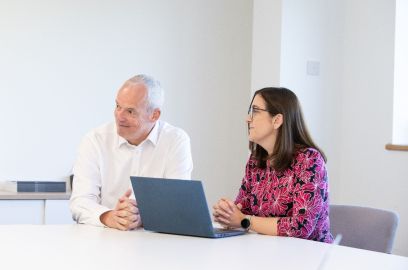The Board recognises the importance of strong corporate governance and that a good governance framework should evolve as the Company’s businesses, and the environment in which those businesses operate, develop.
We have elected to adopt the Quoted Companies Alliance Corporate Governance Code (‘the QCA Code’) which we believe has been constructed in a simple, practical and effective style and that meaningful compliance with its ten main principles should provide shareholders with confidence in how the Company operates.
Continuous improvement
Amanda Burton
Non-Executive Director and Chair
On behalf of the Board, I am pleased to present NWF Group plc’s Corporate Governance Statement for the year ended 31 May 2025. This statement provides details of our current governance framework and practices and how we discharge our governance duties.

The Board recognises the fundamental importance of maintaining a strong corporate governance framework in order to continue to create long-term value.
On behalf of the Board, I am pleased to present NWF Group plc’s Corporate Governance Statement for the year ended 31 May 2025. This statement provides details of our current governance framework and practices and how we discharge our governance duties.
Whilst 2024/25 has been a challenging year, I am delighted that the Group has achieved a robust financial outturn, slightly ahead of initial market expectations. The Group has made significant progress against its strategy through delivering two acquisitions and the successful implementation of business improvement initiatives. Strong results in Fuels and Feeds have offset the outcome in Food where decisive actions have been taken to improve performance.
In my role as Chair, I am responsible for the Board including its effective leadership and composition, assessing and improving its performance, and leading the Group’s corporate governance culture to ensure that an appropriate governance framework is embedded within the Group and its businesses. The Board recognises the fundamental importance of maintaining a strong corporate governance framework in order to continue to create long-term value and 2024/25 has seen the Group’s governance framework continue to develop.
The Group has continued to adopt the Quoted Companies Alliance Corporate Governance Code (‘the QCA Code’) as the basis of its governance structure and has complied with all principles of the QCA Code throughout the year. Given the Group’s size, we also endeavour to have regard to the provisions of the UK Corporate Governance Code to the extent that we believe this is appropriate. As such, all Board Directors are required to stand for annual re-election and our independence policy states that Non-Executive Directors are unable to serve for more than nine years save for in exceptional circumstances.
With a total of three NED appointments, the Group has an appropriate balance between Executive and Independent Non-Executive Directors and is in line with Principle 6 of the QCA Code.
The Board recognises that sustainability of the Group is key to its long-term success. As such, 2024/25 saw a continued focus on strengthening our approach to how we govern sustainability (further details can be found on pages 26 and 27 of our Annual Report and Accounts 2025).
The Board acknowledges that a prerequisite of a strong corporate governance framework is a healthy corporate culture. The Group continues to focus on instilling a uniformed corporate culture across the Group throughout 2024/25 predicated upon ethical values, integrity and transparency.
For our strategy and business model to succeed in creating sustainable value in the long term, and to enable the mitigation of our principal risks and uncertainties (as detailed on pages 22 to 25 of our Annual Report and Accounts 2025), positive relationships with the Group’s various stakeholders must be cultivated. This will only be achieved through integrity and transparency. The Board monitors the Group’s culture through engagement with the Group’s stakeholders (further details on how we engage can be found on pages 42 to 44 of our Annual Report and Accounts 2025), the regular review of the Group’s consolidated risk register and any changes to the principal risks and uncertainties and externally facilitated employee and customer surveys which allow us both to engage and identify areas of focus.
In order to promote a healthy corporate culture, the Group operates a whistleblowing policy which allows concerns regarding unethical or unsafe behaviours to be raised in confidence and promptly investigated. This policy was refreshed in 2024/5. During the year, a conflict of interest in relation to a commercial arrangement in the Food business was uncovered and thoroughly investigated by an independent accountancy firm. As a consequence, significant changes to the operating model of the Food business were made and the controls framework across the whole Group was strengthened. To ensure ethical values and behaviours are recognised and respected, the Group has a suite of policies in place covering areas such as anti-corruption and bribery, equal opportunities, prevention of the facilitation of tax evasion and modern slavery. The Board is now satisfied that an improved ethical culture exists within the Group.
Our strategy
The Group’s strategy is to grow organically and through acquisitions to deliver long-term sustainable value for its shareholders and stakeholders. This is achieved by the implementation of the Group’s acquisition strategy, focused on the consolidation of the highly fragmented fuel market (further details can be found on pages 14 and 15 of our Annual Report and Accounts 2025), and investing in the Group’s people, businesses and technology to create innovative services.
Effective risk management and internal control
The achievement of the Group’s strategy is dependent upon the effective identification and management of new and existing risks. The Board recognises though that the risks faced by the Group also present opportunities for innovation and growth. The principal risks and uncertainties affecting the Group, and how these risks are identified, assessed, managed and reviewed, are explained on pages 22 to 25 of our Annual Report and Accounts 2025.
The Board has overall responsibility for ensuring that the Group maintains an effective system of internal control which directs the Group’s activities in order to ensure the safeguarding of assets, to assist in the delivery of the Group’s strategic, financial and operational ambitions and to provide it with reasonable assurance regarding the reliability of financial information that is used within the business.
There are, however, inherent limitations in any system of internal control and accordingly even the most effective system can provide only reasonable, and not absolute, assurance against material misstatement or loss. The Board obtains assurance that the risk management and related control systems in place are effective in a number of ways. During the year a rolling programme of risk and controls testing has been undertaken across the Group with a focus on various key areas of risk identified. This programme was undertaken through a combination of internal and external resource and the results were reported to the Board. Lessons learnt from the conflict of interest investigation were implemented to strengthen the internal controls framework. The Group’s risk management programme, which assesses key risks and the required internal controls that are delegated to Directors and managers at all levels in the Group, is reviewed regularly in order to ensure that it continues to meet the Board’s requirements. Although the Group does not have a formal internal audit function, targeted reviews and visits to operations are conducted by the Head Office team and professional advisors. The results of these reviews are communicated back to the Audit Committee. An internal control update is provided to the Audit Committee at each meeting. Further details can be found on pages 54 to 56 of our Annual Report and Accounts 2025.
Maintaining a dynamic management framework
Board
Matters reserved for the Board include:
- Setting the Group’s values, standards, strategic aims and objectives.
- Approval of budgets and reviewing performance in line with these.
- Extension or cessation of the Group’s activities.
- Approval of financial reports and policies, dividends and the dividend policy.
- Ensuring maintenance of a sound system of internal control and risk management.
- Approval of major capital projects, material contracts and major investments.
- Changes to the structure, size and composition of the Board, membership of Board Committees and succession planning.
- Approval of remuneration policies.
Audit Committee
Its remit is:
- to monitor the integrity of financial reporting and keep under review the Group’s internal control and risk management systems.
Disclosure Committee
Its remit is:
- consider whether announcements are required to be made in relation to inside information.
Nomination Committee
Its remit is:
- to develop and maintain a rigorous and transparent procedure for making recommendations on Board and material subsidiary company board appointments and ensure plans are in place for orderly succession to Board and senior management positions.
Remuneration Committee
Its remit is:
- to determine appropriate short and long-term total reward packages for the Executive Directors and satisfy itself that good practices apply to all Group employees through the relevant management structures.
ESG Committee
A clearly defined Board structure
The principal roles of the Board are to provide effective leadership, ensure an ethical corporate culture and effective risk management system are embedded throughout the Group, oversee external reporting and set the Group’s strategy in order to deliver shareholder value.
A formal schedule of matters requiring Group Board approval is maintained and regularly reviewed to ensure sufficient separation between the responsibilities of the Board and the operation of the Group’s business.
Board Committees
There are currently four Board Committees to which the Board delegates specific responsibilities: the Audit Committee, Remuneration Committee, Nomination Committee and Disclosure Committee. The responsibilities of each Committee are detailed in its terms of reference which are reviewed annually and are available on the Group’s website.
Further details on the activities of the Audit Committee, the Remuneration Committee and the Nomination Committee can be found on pages 54 to 56, pages 58 to 63 and pages 57 and 58 of our Annual Report and Accounts 2025 respectively. The Chair of each Committee formally reports to the Board in respect of the Committee’s activities and recommendations.
Executive Directors and Executive Leadership Team
The implementation of the strategy agreed by the Board and day-to-day management of the Group are delegated to the Executive Directors and senior management. This structure allows for decisions to be made in an efficient manner by the most appropriate people. Each business’ senior management team has a monthly meeting with the Executive Directors to report on the business’ progress and any challenges. Senior management also regularly attends Board meetings to brief the Board on business opportunities and developments.
In order for the Board to be effective, there needs to be clearly defined roles for Board members, an appropriate balance of Executive and Non-Executive Directors, sufficient time committed by Directors to their roles, a comprehensive, tailored induction for each Director upon joining the Board and the provision of quality information in a timely manner. The Board must comprise an appropriate balance of skills, experience and personal qualities.
Director induction
Upon joining the Group, each Director completes a full, formal and tailored induction programme. This programme ensures each new Director is fully informed, engaged and supported, enabling the Director to effectively contribute to the Group from the start of their appointment.
Board composition
The Board currently comprises a Non-Executive Chair, a Senior Independent Non-Executive Director, one Independent Non-Executive Director and two Executive Directors.
Board roles
The roles of Chair and Chief Executive Officer are separated and clearly understood and have been agreed by the Board.
The Senior Independent Non-Executive Director conducts the Chair’s annual appraisal and acts as a sounding board for the other Directors. Further information on the role of the Senior Independent Director can be found at Corporate governance statement.
The Group General Counsel and Company Secretary has specific responsibilities to assist the Chair and the rest of the Board to uphold the best corporate governance standards. A full role description for the Company Secretary is available at Corporate governance statement.
Board operation
The Board normally meets nine times a year with additional meetings being called when required.
The number of Board and Committee meetings held in the year ended 31 May 2025, together with the attendance record for each Director, is detailed below.
Comprehensive briefing papers are circulated to Directors one week in advance of each scheduled meeting to allow sufficient time for the consideration of the papers provided.
Skills and experience
The importance of the Board having an appropriate mix of skills, qualities and experience in order to deliver the strategic objectives of the Company for the benefit of its shareholders and stakeholders is understood. All Directors have extensive and varied experience and the Board as a whole contains a diverse mix of personal qualities. The biographical details of the current Directors, including their skills and experience, are set out on pages 46 and 47 of our Annual Report and Accounts 2025.
To ensure that the Directors have the necessary up-to-date experience, skills and capabilities, each Director undergoes an annual performance appraisal and the Board’s effectiveness as a whole is evaluated on an annual basis (further details can be found on page 53 of our Annual Report and Accounts 2025). A training log is maintained in respect of all Directors and senior management and is updated on a quarterly basis. In addition, the Group’s Nominated Advisor and Broker provides an annual briefing to the Board on areas including regulatory updates, the AIM Rules and Market Abuse Regulation requirements. An annual health and safety briefing is also provided to the Board by the Group’s external health and safety advisors, providing the Directors with information on current health and safety trends. Information on upcoming legal, regulatory and accounting changes are also prepared internally and provided to the Board as and when appropriate.
All Directors and senior management are able to access the advice and services of the Group General Counsel and Company Secretary. Furthermore, all Directors have access to the Group’s advisors and are able, if necessary, to take independent professional advice in the furtherance of their duties at the Group’s expense.
The Board and the Committees to the Board are supported by external advisors on a regular basis in respect of matters such as remuneration, pensions, taxation, property and health and safety. Deloitte LLP continued to act as professional advisors to the Remuneration Committee during the year. Grant Thornton also continued to act as the Group’s virtual Chief Information and Security Officer to oversee the Group’s information security regime.
Independence
The Board recognises the importance of the diverse expertise and experience brought by its Non-Executive Directors as well as the need for the periodical refreshing of the Board. The Board has reviewed the independence of each Non-Executive Director and considers that all are independent. The factors considered by the Board in reaching this conclusion included all Non-Executive Directors being financially independent of the Company and none of the Non-Executive Directors being connected with, or a major shareholder or member of a stakeholder group. All Directors will continue to be re-elected on an annual basis and, prior to being proposed for re-election, will undergo a performance evaluation to ensure their performance continues to be effective and that their independence is maintained, where appropriate.
Time commitment
The Board has adopted a formal time commitments (overboarding) policy which states that when making new appointments, and considering additional appointments for existing Directors, the Board shall take into account other demands on the Director’s time. Significant commitments shall be disclosed with an indication of the time involved and additional external appointments shall not be undertaken without prior approval of the Board.
Full-time Executive Directors are permitted to take a maximum of one non-executive directorship or other significant appointment, subject to prior approval of the Board. Non-Executive Directors are required to limit their number of board appointments to a total of five public company board roles. Non-Executive Directors, who are in a full-time executive role, can only hold a single non-executive role at any time. The Chair shall be a Non-Executive Director and shall not be a serving full-time executive director on another board. An independent board chair role will count as two board roles.
Non-Executive Directors’ time commitments are reviewed annually to ensure each Director has sufficient time to fulfil their role.
Attendance of Directors at meetings during the year ended 31 May 2025
| Board | Audit Committee |
Remuneration Committee |
Nomination Committee |
|
|---|---|---|---|---|
| Philip Acton1 | ||||
| Richard Armitage2 | ||||
| Chris Belsham | ||||
| Amanda Burton3 | ||||
| Tim Cooper4 | ||||
| Katie Shortland5 |
Attended
Did not attend
Meeting held prior to individual's appointment or individual not a member of that committee
Meeting held after individual's resignation
- Board Chair and Nomination Committee Chair until 26 September 2024; resigned from Board 30 October 2024.
- Senior Independent Director, Audit Committee Chair and, until 26 September 2024, Remuneration Committee Chair.
- Director from 18 July 2024 and Board & Nominations Committee Chair from 26 September 2024.
- Director from 18 July 2024 and Remuneration Committee Chair from 26 September 2024.
- Disclosure Committee Chair.
Process
The actions identified from the 2024 Board appraisal included:
- to keep under review whether the Board appraisal should be externally facilitated;
- to enhance disclosure of the Directors’ skill sets and how these are kept up to date; and
- to review and enhance website disclosures where appropriate.
The Board has updated its approach to disclosure of Directors’ skill sets in this Annual Report and, in March 2025, Conseo Board Review Limited was engaged to carry out a Board Effectiveness Review. This was the first time the Board had engaged an external facilitator to review its effectiveness. It was considered appropriate to engage an external provider at this time recognising the in-year appointments of a new Chair and Non-Executive Director.
The external facilitator has interviewed all Directors and the Group General Counsel and Company Secretary and observed a Board and Committee meeting in June 2025. A report will then be presented to the Board at its meeting in September 2025 at which all recommendations will be carefully considered and a roadmap to implementing appropriate recommendations will be developed.
Outcomes
The outcomes of the Board Effectiveness Review will be reported on in the next Annual Report and Accounts.



